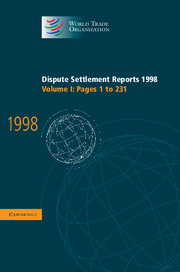Book contents
- Frontmatter
- Contents
- European Communities - Regime for the Importation, Sale and Distribution of Bananas, complaints by Ecuador, Guatemala, Honduras, Mexico and the United States (WT/DS27): Award of the Arbitrator under Article 21.3(c) of the DSU
- India - Patent Protection for Pharmaceutical and Agricultural Chemical Products, complaint by the United States (WT/DS50): Report of the Appellate Body
- India - Patent Protection for Pharmaceutical and Agricultural Chemical Products, complaint by the United States (WT/DS50): Report of the Panel
- European Communities - Measures Concerning Meat and Meat Products (Hormones), complaints by the United States (WT/DS26) and Canada (WT/DS48): Report of the Appellate Body
India - Patent Protection for Pharmaceutical and Agricultural Chemical Products, complaint by the United States (WT/DS50): Report of the Panel
Published online by Cambridge University Press: 24 July 2020
- Frontmatter
- Contents
- European Communities - Regime for the Importation, Sale and Distribution of Bananas, complaints by Ecuador, Guatemala, Honduras, Mexico and the United States (WT/DS27): Award of the Arbitrator under Article 21.3(c) of the DSU
- India - Patent Protection for Pharmaceutical and Agricultural Chemical Products, complaint by the United States (WT/DS50): Report of the Appellate Body
- India - Patent Protection for Pharmaceutical and Agricultural Chemical Products, complaint by the United States (WT/DS50): Report of the Panel
- European Communities - Measures Concerning Meat and Meat Products (Hormones), complaints by the United States (WT/DS26) and Canada (WT/DS48): Report of the Appellate Body
Summary
INTRODUCTION
On 2 July 1996, the United States requested India to hold consultations pursuant to Article 4 of the Understanding on Rules and Procedures Governing the Settlement of Disputes (DSU) and Article 64 of the Agreement on Trade- Related Aspects of Intellectual Property Rights (TRIPS) regarding the absence in India of either patent protection for pharmaceutical and agricultural chemical products or formal systems that permit the filing of patent applications for pharmaceutical and agricultural chemical products and that provide exclusive marketing rights in such products (WT/DS50/1). No mutually satisfactory solution was reached in these consultations, held on 27 July 1996. The United States requested the Dispute Settlement Body (DSB), in a communication dated 7 November 1996, to establish a panel to examine the matter (WT/DS50/4). At its meeting of 20 November 1996, the DSB agreed to establish a panel with standard terms of reference in accordance with Article 6 of the DSU.
In document WT/DS5O/5 of 5 February 1997, the DSB was informed that the terms of reference and the composition of the Panel were as follows:
Terms of Reference
“To examine, in the light of the relevant provisions of the covered agreements cited by the United States in document WT/DS50/4, the matter referred to the DSB by the United States in that document and to make such findings as will assist the DSB in making the recommendations or in giving the rulings provided for in those agreements.“
Composition
Chairman: Mr. Thomas Cottier
Panelists: Mr. Douglas Chester
Mr. Yanyong Phuangrach
The Panel heard the parties to the dispute on 15 April and 13 May 1997. The Panel decided to give the parties the chance to comment, after the second session, in writing on each other's arguments related to the United States’ claim based on Article 63, which claim had been made for the first time at the first session. The interim report was issued to the parties on 27 June 1997. Only India requested the Panel to review parts of the interim report and no request was received to hold an additional meeting.
FACTUAL ASPECTS
The questions before this Panel concern the obligations India has as a WTO Member by virtue of certain transitional provisions of the TRIPS Agreement and are to be divided into questions related to the provisions of Article 70.8 of the TRIPS Agreement and questions related to the provisions of Article 70.9 of that Agreement.
- Type
- Chapter
- Information
- Dispute Settlement Reports 1998Volume I: Pages 1-231, pp. 41 - 134Publisher: Cambridge University PressPrint publication year: 2000



